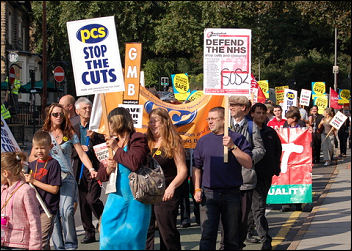Fighting NHS cuts and privatisation…
United action can win!

LAST WEEKEND was a weekend of protest to save the National Health
Service. 400 marched in Sheffield, 2,000 in Plymouth, and the largest
demonstration was in Grantham, where 9,000 came out to save their local
hospital.
Lois Austin
More protests are planned across the country over the coming weeks as
wards and hospitals close or are threatened with closure and thousands
of NHS jobs are lost.
And now the biggest strike in the NHS for 18 years will take place
just before Labour Party conference. 74% of those who took part in a
ballot against privatisation of NHS Logistics voted for strike action.
These workers are angry that the government is forcing through the
privatisation of the stores and supplies – one of the best performing
parts of the NHS – worth £3.7 billion over the next ten years.
NHS Logistics is due to be handed over to the private courier firm
DHL on 1 October. The Logistics workers’ struggle, if successful, like
the Waltham Forest health workers’ strike over wages and conditions,
will give confidence to other health workers to take action.
Unfortunately, the national trade union leaders have responded too
slowly to this threatened privatisation. However, under the pressure
from the Logistics workers, the first strike will probably take place on
21 September.
Given the national anger over the government’s ripping up of the NHS,
the Logistics strike could act as the catalyst which unites the
disparate local struggles into a more united and organised national
campaign. These workers need the support and solidarity of other health
workers and campaigners urgently to ensure they defeat privatisation,
and rallies and meetings should be organised up and down the country.
The anger of workers is increasing throughout the health service.
Wakefield Unison health branch is to hold a ballot for industrial action
against the threat of compulsory redundancies. In Whipps Cross hospital
in Waltham Forest porters, cleaners and other ancillary workers have
held eight days of industrial action over wages and conditions.
The heat is definitely being turned on the government. And protesting
and demonstrating works. In Wiltshire, the health authority has
announced a one-year reprieve for five of the six hospitals up for
closure. This is after just one demonstration against hospital closures.
The campaigns have to now develop a strategy of joint community and
health worker action to save the hospitals in that county for the long
term.
The struggle against hospital closures and privatisation is urgent.
Local campaigns are springing up everywhere, particularly in the South
West where hospitals are being closed. Where campaigns don’t exist they
need to be set up. Joint meetings, protests and demonstrations of health
workers, patients and the wider community need to be organised
everywhere. We are encouraging a large ‘save our NHS’ contingent on the
demonstration at Labour Party conference in Manchester.
Pressure should be brought to bear on regional health trade unions to
hold regional demonstrations like the one in Leicester on 23 September.
But all of these campaigns urgently need a national focus for the
struggle to defend the NHS to develop and be capable of defeating the
government – similar to the structures and national focus built by the
anti-poll tax campaigners.
National demo

Under pressure from below, the health unions and TUC have set a
timetable of action. This is a step forward, but so far there is very
little detail and no dates for action apart from a lobby of parliament
on 25 October and a national demo in February. But we need a national
demonstration this side of Christmas. By next February many of the cuts
will have been carried out
Keep Our NHS Public (KONHSP) which has done good work in raising the
issues around NHS reform, should call a national demonstration in the
autumn if the unions won’t.
Of course, it is preferable that the TUC utilise its authority and
call a national demonstration but it has been dragging its heels. KONHSP
should of course campaign for the TUC to back any demonstration they
call.
However, the mood of anger that has swept the country is such that a
national demonstration, even without official TUC backing, could
mobilise thousands onto the streets of London.
Campaigners should build to make the UNISON lobby of Parliament a
success. But some campaigners are frustrated that a lobby will not have
the same appeal as a big public display on the streets of central London
of health workers and campaigners opposed to cuts and privatisation.
This is why some local campaigners have initiated a feeder march to
the lobby and are calling on other campaigners and health workers to
join with them. The Socialist Party will do everything it can to make
this as successful as possible.
Given the anger which exists, we think that many people will be moved
to join this feeder march and in that way raise the pressure on the
union leaders to call a national demonstration this year.
It is possible that the National Health Service could become Tony
Blair’s poll tax. For that to happen the anger which exists needs to be
galvanised into a national campaign that is prepared to build mass
protests and industrial action around the country.







